 Petzlover
Petzlover Persian is originated from Iran but Ragamuffin is originated from United States. Both Persian and Ragamuffin are having almost same weight. Persian may live 6 years less than Ragamuffin. Both Persian and Ragamuffin has same litter size. Both Persian and Ragamuffin requires Moderate Maintenance.
Persian is originated from Iran but Ragamuffin is originated from United States. Both Persian and Ragamuffin are having almost same weight. Persian may live 6 years less than Ragamuffin. Both Persian and Ragamuffin has same litter size. Both Persian and Ragamuffin requires Moderate Maintenance.
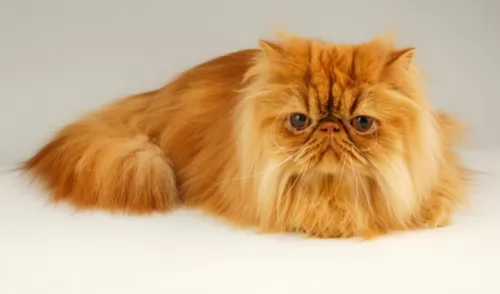 Cat lovers the world over know the Persian cat very well. It's a beautiful long-haired cat breed with its familiar round face and blunt muzzle.
Cat lovers the world over know the Persian cat very well. It's a beautiful long-haired cat breed with its familiar round face and blunt muzzle.
It is not really known when long-haired cats first appeared, or where the Persian originated but their history stems from Persia or Iran as it is known today, where it seems they were first sighted.
The cats were grey-coated and some were white and soon the cats arrived in Britain. They were introduced to the United States in the 1900s. The cat was developed first by the English, and then also by American breeders after the Second World War and the breeding of these cats has also meant a lot of coat colors.
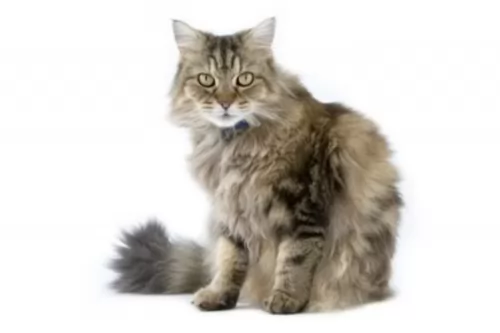 The beautiful Ragamuffin cat is a domestic feline that was established as a separate breed in 1994. It is a variant of the Ragdoll cat.
The beautiful Ragamuffin cat is a domestic feline that was established as a separate breed in 1994. It is a variant of the Ragdoll cat.
It was during the 1960s that a regular long-haired cat that was also white and non-pedigreed produced different litters of kittens, one of which was an unusually docile litter of kittens.
The history of the RagaMuffin can in fact be traced back to the founder of the Ragdoll cat breed, Ann Baker. Breeders working with Ann decided to create their own breed, the Ragamuffin, in 1994. It is a fairly new breed and the Ragamuffin has inherited quite a lot of the Ragdoll cat’s qualities. It arrived in the UK in 2009.
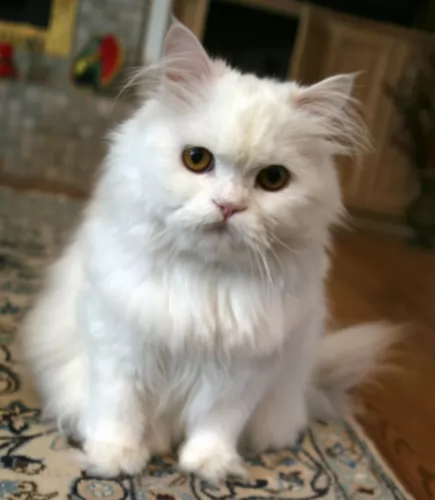 The Persian cat is a medium- to large-sized cat and is heavily boned. He can weigh between 3 and 6kg.
The Persian cat is a medium- to large-sized cat and is heavily boned. He can weigh between 3 and 6kg.
He has stocky legs, a thick neck, small ears, round head, round eyes, and the face is flat or blunt. The kittens are gorgeous balls of fluff.
The coat of the Persian is thick, long, and silky. People many times think only of a white Persian, when in fact the cat comes in many colors and patterns. Eye color for the cat can be blue, green, brown, copper or even odd-eyed.
The Persian isn’t the most active of cats, so attention will need to be given to exercising the cat so as to manage his weight. This cat will also need to have his nutrition controlled to stay in shape and in good health.
Persians enjoy games with their human family and will need some toys to encourage play and exercise.
He is placid and calm but that doesn’t mean he can’t have bursts of energy. They’re quieter than other cats, are sweet-natured, preferring to live in quieter, less boisterous households.
They aren’t loudly vocal but communicate with their eyes and their soft voices. They won’t get on well with small, noisy children but can be loving pets and companions of older children who allow them their own space.
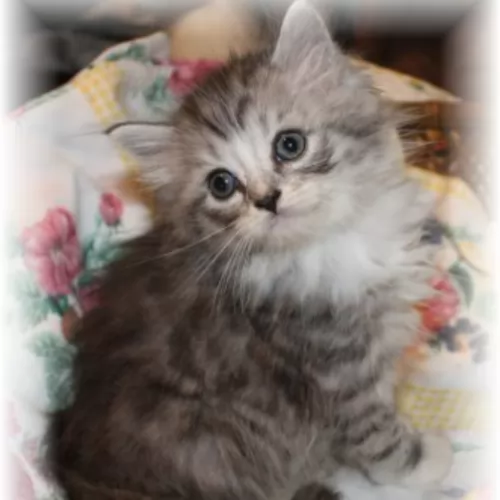 Ragamuffins are large, muscular cats and some of the larger ones can weigh up to 9kg.
Ragamuffins are large, muscular cats and some of the larger ones can weigh up to 9kg.
The chest of the cat is broad, he has a broad head and a well-plumed tail. These medium- to semi-longhaired cats have a thick, plush, silky coat with a ruff around the neck.
The coat is available in a number of colors and patterns, but popular colors are tabby with white, brown, blue and tortoiseshell. The nose of the Ragamuffin is shorter than that of the Ragdoll and the eyes are walnut-shaped. The eyes can be green, blue, or gold.
The Ragamuffin cat is a little bit more energetic than the Ragdoll and is a loving, loyal member of his human family. He is a large but docile cat. These cats are amicable, playful and also intelligent.
Many people train them to walk easily on a leash. They make great companions for single people or families.
Calm and unruffled, he makes the perfect family pet. People are always ready to make a fuss of them because of their beauty and they are always ready to lap up the attention. In fact, these big cats are so fond of attention from their owners that they don’t like being left alone for long periods of time.
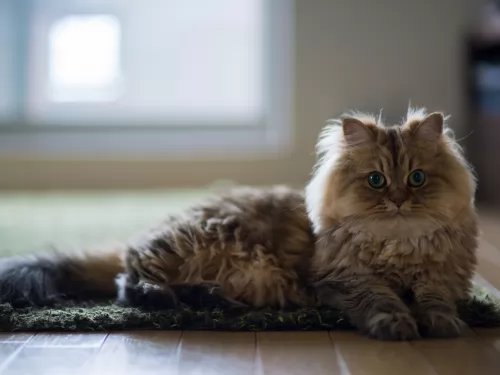 The amicable personality of the Persian cat makes it easy to have these cats in your home. The long hair becomes a bit of an issue as the cat sheds quite a bit.
The amicable personality of the Persian cat makes it easy to have these cats in your home. The long hair becomes a bit of an issue as the cat sheds quite a bit.
They’re sweet, quiet cats and they don’t demand attention from you. They are more than happy just lying quietly in a warm spot. They are calm, loving cats and it's no wonder that they are still such a popular breed of cat.
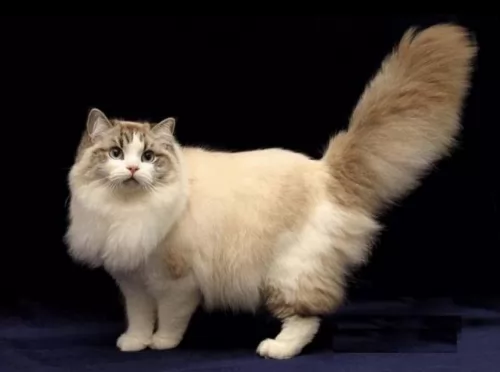 Your RagaMuffin promises to make you a splendid pet. He is such an amicable cat, being social and friendly with his human family.
Your RagaMuffin promises to make you a splendid pet. He is such an amicable cat, being social and friendly with his human family.
He also gets along with your visitors and any other pets you have in the house. Children love his playful, easy-going nature.
Having a Ragamuffin cat in your home is such a pleasure and this large cat is willing to go out of his way to be the perfect pet and companion for you.
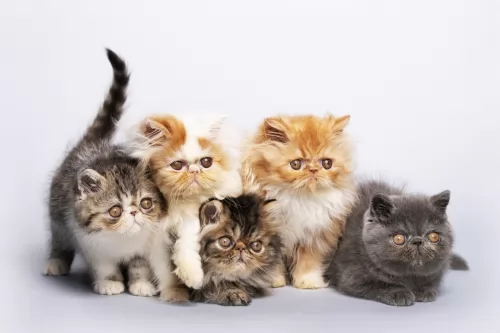 The structure of this cat’s head can mean some health problems. Hereditary Polycystic kidney disease is prevalent with the Persian cat. It is an inherited condition that causes cysts to form in the kidneys. These cysts are actually present from birth, growing larger over time and interfering with kidney function and ending in kidney failure.
The structure of this cat’s head can mean some health problems. Hereditary Polycystic kidney disease is prevalent with the Persian cat. It is an inherited condition that causes cysts to form in the kidneys. These cysts are actually present from birth, growing larger over time and interfering with kidney function and ending in kidney failure.
Also, with a larger breed cat such as the Persian, hip dysplasia is a problem.
Persians are also susceptible to malocclusion which means ‘incorrect bite’. This particular condition can affect the cat’s ability to grasp and actually hold food. So much so in fact, that now pet food manufacturing companies have even developed specially-shaped kibble to cater particularly for the Persian.
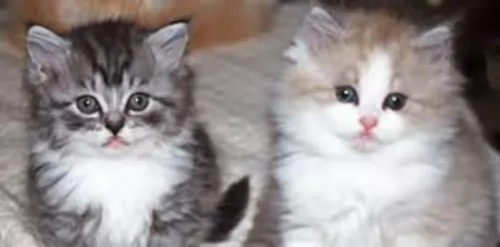 Ragamuffins are healthy cats with no known inherited diseases, but as with all cats you want to know something of the diseases that can plague cats.
Ragamuffins are healthy cats with no known inherited diseases, but as with all cats you want to know something of the diseases that can plague cats.
You’ll want to check that your Ragamuffin has been tested for Hypertrophic cardiomyopathy as well as Polycystic kidney disease.
This is a commonly diagnosed cardiac disease in cats. Feline Hypertrophic Cardiomyopathy causes the muscular walls of a cat's heart to thicken. The heart can no longer work sufficiently. It seems as though genetics plays a role as there are some cats that seem to battle with this disease more than others.
If you catch the disease early enough, the vet can devise a treatment plan to improve the cat’s quality of life.
Although you find this disease more frequently in Persian cats, this inherited disorder can be found in other cat breeds too. Liquid-filled sacs develop in the kidneys, growing in size and taking over kidney tissue which ultimately leads to kidney failure. Your cat will have nausea, vomiting, weight loss, and lethargy, and your cat will have to get to the vet.
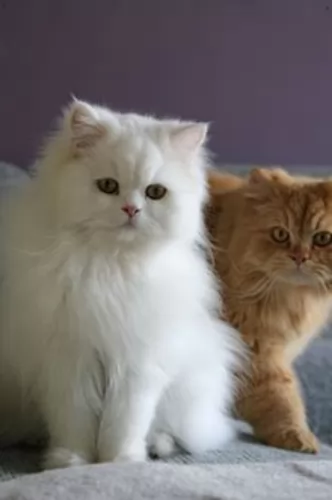 The Persian cat’s coat is long and silky and because he is a fairly heavy shedder, he will require regular brushing – certainly once or twice a week to get rid of that loose hair. It is important to brush and also cut the hair so as to get rid of the tangled knots that form.
The Persian cat’s coat is long and silky and because he is a fairly heavy shedder, he will require regular brushing – certainly once or twice a week to get rid of that loose hair. It is important to brush and also cut the hair so as to get rid of the tangled knots that form.
While brushing your Persian, make sure that his eyes and nose are clear. This is important because the flat face creates problems with these cats.
Excellent cat food for your Persian involves reading labels and understanding what brands are best for your beautiful cat. The Persian cat is a carnivore and will require high-quality food rich in protein.
Speak to your vet if you are in any doubt about the best food for your cat’s health and wellbeing. Make sure your pet has a constant supply of fresh, cool water.
Make sure to keep the litter box clean. Buy a small rake from the pet shop and rake up your cat's feces every single day and dispose of them.
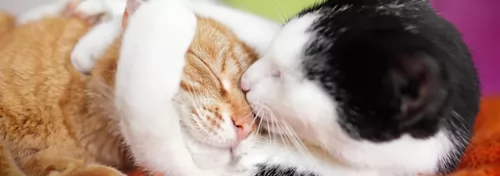 The Ragamuffin's longish coat will require some brushing at least once a week to keep it soft and silky.
The Ragamuffin's longish coat will require some brushing at least once a week to keep it soft and silky.
These are big cats so you will need to provide him with an adequate diet. He is a carnivore and will therefore require meat.
Kittens will eat 4 meals a day while the adult Ragamuffin can have 2 bowls of food. Cats can sometimes be fussy eaters so you want to be sure to give him what he likes from the wet and dry cat goods you get.
The better quality food he eats, the healthier he will be. Your Ragamuffin's dietary needs will also depend on his age.
He should never be without a constant supply of fresh, cool water.
If you have any questions about how to look after your Ragamuffin in the best possible way, speak to your local vet.